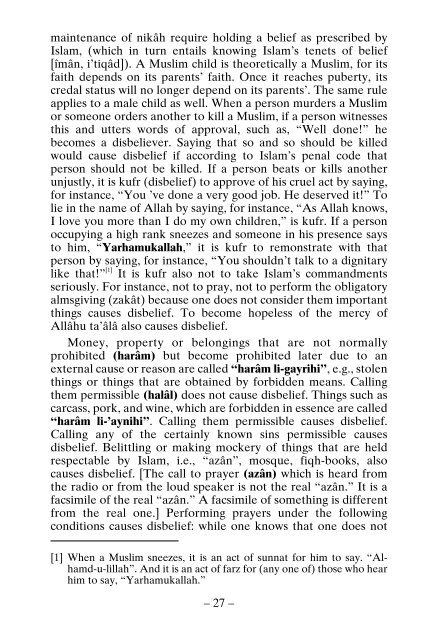Ethics of Islam
Ethics of Islam is taken from the book Berîka by Muhammad Hâdimi. Immorality and ways to get rid of it; 40 depravities and cures to them; usefulness of ethics; what is a soul; strengths of a soul; Personalities emanating from wisdom, courage, chastity and justice are extensively explained.
Ethics of Islam is taken from the book Berîka by Muhammad Hâdimi. Immorality and ways to get rid of it; 40 depravities and cures to them; usefulness of ethics; what is a soul; strengths of a soul; Personalities emanating from wisdom, courage, chastity and justice are extensively explained.
Create successful ePaper yourself
Turn your PDF publications into a flip-book with our unique Google optimized e-Paper software.
maintenance <strong>of</strong> nikâh require holding a belief as prescribed by<br />
<strong>Islam</strong>, (which in turn entails knowing <strong>Islam</strong>’s tenets <strong>of</strong> belief<br />
[îmân, i’tiqâd]). A Muslim child is theoretically a Muslim, for its<br />
faith depends on its parents’ faith. Once it reaches puberty, its<br />
credal status will no longer depend on its parents’. The same rule<br />
applies to a male child as well. When a person murders a Muslim<br />
or someone orders another to kill a Muslim, if a person witnesses<br />
this and utters words <strong>of</strong> approval, such as, “Well done!” he<br />
becomes a disbeliever. Saying that so and so should be killed<br />
would cause disbelief if according to <strong>Islam</strong>’s penal code that<br />
person should not be killed. If a person beats or kills another<br />
unjustly, it is kufr (disbelief) to approve <strong>of</strong> his cruel act by saying,<br />
for instance, “You ’ve done a very good job. He deserved it!” To<br />
lie in the name <strong>of</strong> Allah by saying, for instance, “As Allah knows,<br />
I love you more than I do my own children,” is kufr. If a person<br />
occupying a high rank sneezes and someone in his presence says<br />
to him, “Yarhamukallah,” it is kufr to remonstrate with that<br />
person by saying, for instance, “You shouldn’t talk to a dignitary<br />
like that!” [1]<br />
It is kufr also not to take <strong>Islam</strong>’s commandments<br />
seriously. For instance, not to pray, not to perform the obligatory<br />
almsgiving (zakât) because one does not consider them important<br />
things causes disbelief. To become hopeless <strong>of</strong> the mercy <strong>of</strong><br />
Allâhu ta’âlâ also causes disbelief.<br />
Money, property or belongings that are not normally<br />
prohibited (harâm) but become prohibited later due to an<br />
external cause or reason are called “harâm li-gayrihi”, e.g., stolen<br />
things or things that are obtained by forbidden means. Calling<br />
them permissible (halâl) does not cause disbelief. Things such as<br />
carcass, pork, and wine, which are forbidden in essence are called<br />
“harâm li-’aynihi”. Calling them permissible causes disbelief.<br />
Calling any <strong>of</strong> the certainly known sins permissible causes<br />
disbelief. Belittling or making mockery <strong>of</strong> things that are held<br />
respectable by <strong>Islam</strong>, i.e., “azân”, mosque, fiqh-books, also<br />
causes disbelief. [The call to prayer (azân) which is heard from<br />
the radio or from the loud speaker is not the real “azân.” It is a<br />
facsimile <strong>of</strong> the real “azân.” A facsimile <strong>of</strong> something is different<br />
from the real one.] Performing prayers under the following<br />
conditions causes disbelief: while one knows that one does not<br />
[1] When a Muslim sneezes, it is an act <strong>of</strong> sunnat for him to say. “Alhamd-u-lillah”.<br />
And it is an act <strong>of</strong> farz for (any one <strong>of</strong>) those who hear<br />
him to say, “Yarhamukallah.”<br />
– 27 –

















